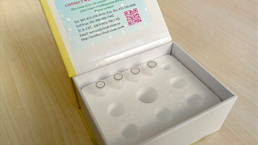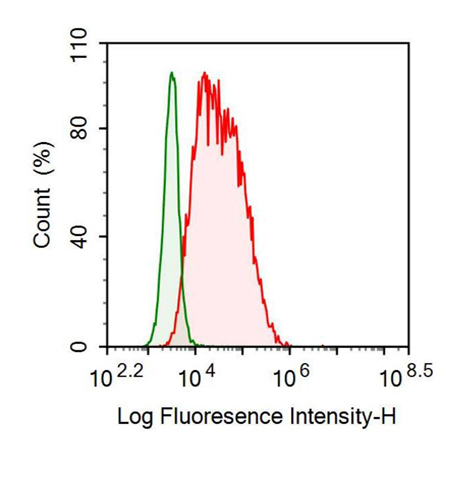Recombinant Antibody to Mucin 1 (MUC1) 

CD227; EMA; H23AG; KL-6; PEM; PEMT; PUM; CA15-3; CA153; Cancer antigen 15-3; Carcinoma-associated mucin; Episialin; Peanut-reactive urinary mucin; Polymorphic epithelial mucin
- UOM
- FOB US$ 171.00 US$ 399.00 US$ 570.00 US$ 1,425.00 US$ 5,700.00
- Quantity
Overview
Properties
- Product No.RAA413Hu21
- Organism SpeciesHomo sapiens (Human) Same name, Different species.
- ApplicationsFCM
If the antibody is used in flow cytometry, please check FCM antibodies.
Research use only - Downloadn/a
- CategoryTumor immunityInfection immunityPulmonology
- SourceRecombinant monoclonal antibody preparation, Host Mouse
- Ig Isotype IgG, Clone Number n/a
- PurificationProtein A + Protein G affinity chromatography
- LabelNone
- Immunogen n/a
- Buffer FormulationPBS, pH7.4, containing 0.02% NaN3, 50% glycerol.
- TraitsLiquid, Concentration 1mg/mL
Sign into your account
Share a new citation as an author
Upload your experimental result
Review

Contact us
Please fill in the blank.
Specifity
The antibody is a mouse monoclonal antibody raised against MUC1. It has been selected for its ability to recognize MUC1 in immunohistochemical staining and western blotting.
Usage
Western blotting: 0.2-2μg/mL;
Immunohistochemistry: 5-20μg/mL;
Immunocytochemistry: 5-20μg/mL;
Flow cytometry:10μg/ml;
Optimal working dilutions must be determined by end user.
Storage
Store at 4°C for frequent use. Stored at -20°C in a manual defrost freezer for two year without detectable loss of activity. Avoid repeated freeze-thaw cycles.
Stability
The thermal stability is described by the loss rate. The loss rate was determined by accelerated thermal degradation test, that is, incubate the protein at 37°C for 48h, and no obvious degradation and precipitation were observed. The loss rate is less than 5% within the expiration date under appropriate storage condition.
Giveaways
Increment services
-
 Antibody Labeling Customized Service
Antibody Labeling Customized Service
-
 Protein A/G Purification Column
Protein A/G Purification Column
-
 Staining Solution for Cells and Tissue
Staining Solution for Cells and Tissue
-
 Positive Control for Antibody
Positive Control for Antibody
-
 Tissue/Sections Customized Service
Tissue/Sections Customized Service
-
 Phosphorylated Antibody Customized Service
Phosphorylated Antibody Customized Service
-
 Western Blot (WB) Experiment Service
Western Blot (WB) Experiment Service
-
 Immunohistochemistry (IHC) Experiment Service
Immunohistochemistry (IHC) Experiment Service
-
 Immunocytochemistry (ICC) Experiment Service
Immunocytochemistry (ICC) Experiment Service
-
 Flow Cytometry (FCM) Experiment Service
Flow Cytometry (FCM) Experiment Service
-
 Immunoprecipitation (IP) Experiment Service
Immunoprecipitation (IP) Experiment Service
-
 Immunofluorescence (IF) Experiment Service
Immunofluorescence (IF) Experiment Service
-
 Buffer
Buffer
-
 DAB Chromogen Kit
DAB Chromogen Kit
-
 SABC Kit
SABC Kit
-
 Long-arm Biotin Labeling Kit
Long-arm Biotin Labeling Kit
-
 Mouse Antibody Variable Region Gene Amplification Kit
Mouse Antibody Variable Region Gene Amplification Kit
-
 Real Time PCR Experimental Service
Real Time PCR Experimental Service
Citations
- Pancreatic cyst fluid and serum mucin levels predict dysplasia in intraductal papillary mucinous neoplasms of the pancreas.PubMed: 20717734
- Host Defense Proteins in Breast Milk and Neonatal Yeast ColonizationPubMed: 26116637
- Activated Leukocyte Cell Adhesion Molecule (ALCAM) in Saudi Breast Cancer Patients as Prognostic and Predictive IndicatorPubMed: 26446295
- The Presence and Anti-HIV-1 Function of Tenascin C in Breast Milk and Genital FluidsPubmed:27182834
- The influence of long-term corneal contact lens wearing on the stability and quality of tear film in Qinghaifiles:ijcem0020163.pdf
- Ultrasensitive detection of mucin 1 biomarker by immuno-loop-mediated isothermal amplification.pubmed:28107977
- An adherent mucus layer attenuates the genotoxic effect of colibactin. pubmed:29156489
- Enhancement of Mucus Production in Eukaryotic Cells and Quantification of Adherent Mucus by ELISA10.21769:BioProtoc.2879
- Aptasensors as a new sensing technology developed for the detection of MUC1 mucin: A review
- A highly sensitive label-free electrochemical immunosensor based on AuNPs-PtNPs-MOFs for nuclear matrix protein 22 analysis in urine sample






